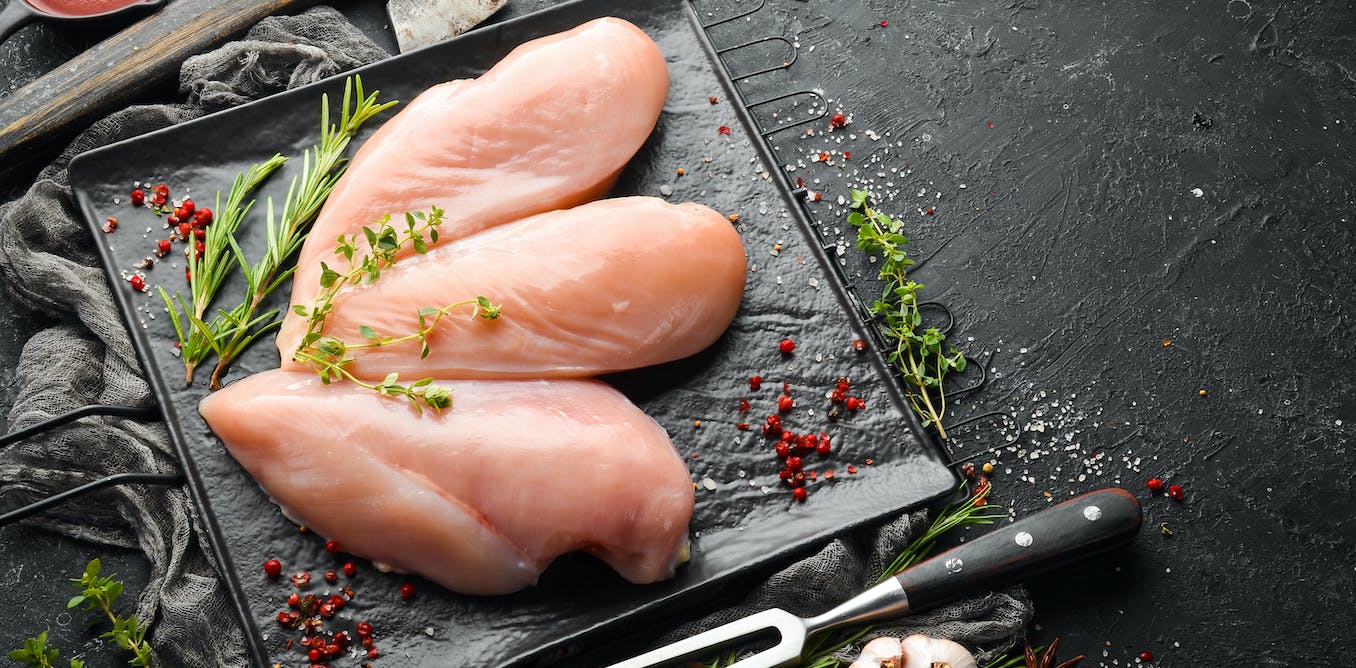No, you shouldn’t wash raw chicken before cooking it. So why do people still do it?

Image: Shutterstock
In summary
Analysis for The Conversation by Professor of Microbiology Enzo Palombo
Food safety authorities and regulators around the world recommend you don’t wash raw poultry before cooking.
That’s because washing chicken can splash dangerous bacteria around the kitchen. It’s best just to thoroughly cook the chicken without washing it, so it is safe to eat.
Despite this, chicken-washing remains common. A survey by Australia’s Food Safety Information Council showed almost half of Australian home cooks washed whole chickens before cooking. Dutch research found 25% of consumers washed their chicken often or almost always.
So why do people do it – and what does the research say about the risks of chicken-washing?

Australia’s Food Safety Information Council recommends raw poultry not be washed before cooking. Image: Shutterstock
Chicken meat and germs
Incorrect cooking temperatures and cross-contamination between different foods are two of the most important factors linked to foodborne illness.
This is particularly relevant to poultry meat. Two leading causes of foodborne illness are the bacteria Campylobacter and Salmonella, which are commonly found on raw poultry.
In Australia, reported cases of Campylobacter and Salmonella have almost doubled over the last two decades.
Of the estimated 220,000 cases of Campylobacter infection each year, 50,000 can be attributed either directly or indirectly to chicken meat.

Why do many home cooks continue to wash chicken before cooking? Photo by Pixabay, CC BY
Chicken-washing myths, busted
One analysis of consumer responses to an education campaign about the dangers of washing raw poultry shed light on why many people still wash raw chicken before cooking.
Some believe there is a need to wash faeces and other matter off the chicken meat. In fact, modern processing techniques mean chicken carcasses do not need additional cleaning.
Others believe washing with a slightly acidic solution (such as vinegar or lemon juice) will kill bacteria.
On the contrary, research has shown washing raw poultry in lemon juice or vinegar does not remove bacteria and can increase the cross-contamination risk.

Washing chicken splashes bacteria around
One of the more compelling arguments why washing raw poultry under a running tap is a risky activity comes from recent research on water droplets ejected from the surface of washed chicken.
The study clearly showed bacteria can be transferred from the surface of the chicken to surrounding surfaces via water droplets.
Using high-speed imaging, the researchers found a higher tap height can increase splashing.
Chicken meat is often soft and the water flow can create a divot in the surface. This leads to splashing that would not occur on a curved, hard surface.
The researchers placed large agar plates next to the chicken surfaces to capture any water droplets. This allowed them to grow the bacteria that were transferred with the splashed water.
They found the level of bacterial transmission increased with greater tap height and water flow rate.
Aerated water (which is what you get when the tap is running very hard) also increased splashing and bacterial transmission.
What if I still really want to wash my chicken meat?
While washing raw poultry is not recommended, it appears some home cooks are reluctant to let go of this old habit.
If you insist on washing chicken meat, consider doing so in a sink of water rather than under a running tap.
Use a paper towel to mop up any liquids, dispose of the towel and clean up afterwards.
This will help reduce the risk of cross-contamination and keep the kitchen safe. And please wash your hands after handling raw meat!
This article was originally published on The Conversation.
-
Media Enquiries
Related articles
-

- Technology
- Science
- Engineering
Victorian students drive green energy transition through international hydrogen competition
Swinburne’s KIOSC, in collaboration with Horizon Educational and Gippsland Tech School, co-hosted the Hydrogen Grand Prix in Melbourne.Friday 26 July 2024 -

- Technology
- Health
New MedTechVic prototypes to transform everyday lives of people with a disability
Swinburne’s MedTechVic has revealed three new prototypes designed through the joint Health-led Manufacturing Innovation Program, in partnership with the Australian Medtech Manufacturing Centre and Safer Care Victoria
Friday 19 July 2024 -

- Science
Skin, scales and fish tails: using collagen to turn fish guts into gold
New research from Swinburne could transform the sector by converting high value collagen proteins from seafood by-products into cosmetics, food, and pharmaceuticals.
Tuesday 02 July 2024 -

- Science
- Engineering
Submarines in the future could self-identify cracks and self-heal thanks to Swinburne researcher
Thanks to the work of Dr Nisa Salim from Swinburne University of Technology’s School of Engineering, future submarines could self-identify microcracks and self-heal using a new kind of carbon fibre reinforced polymer composites.
Monday 17 June 2024 -

- Science
Inaugural Swinburne-CSIRO Indigenous Research Fellow joins national water quality forecasting project
Swinburne University of Technology has appointed spatial ecologist Associate Professor Sally Waller as its inaugural Swinburne-CSIRO Indigenous Research Fellow...
Thursday 13 June 2024

